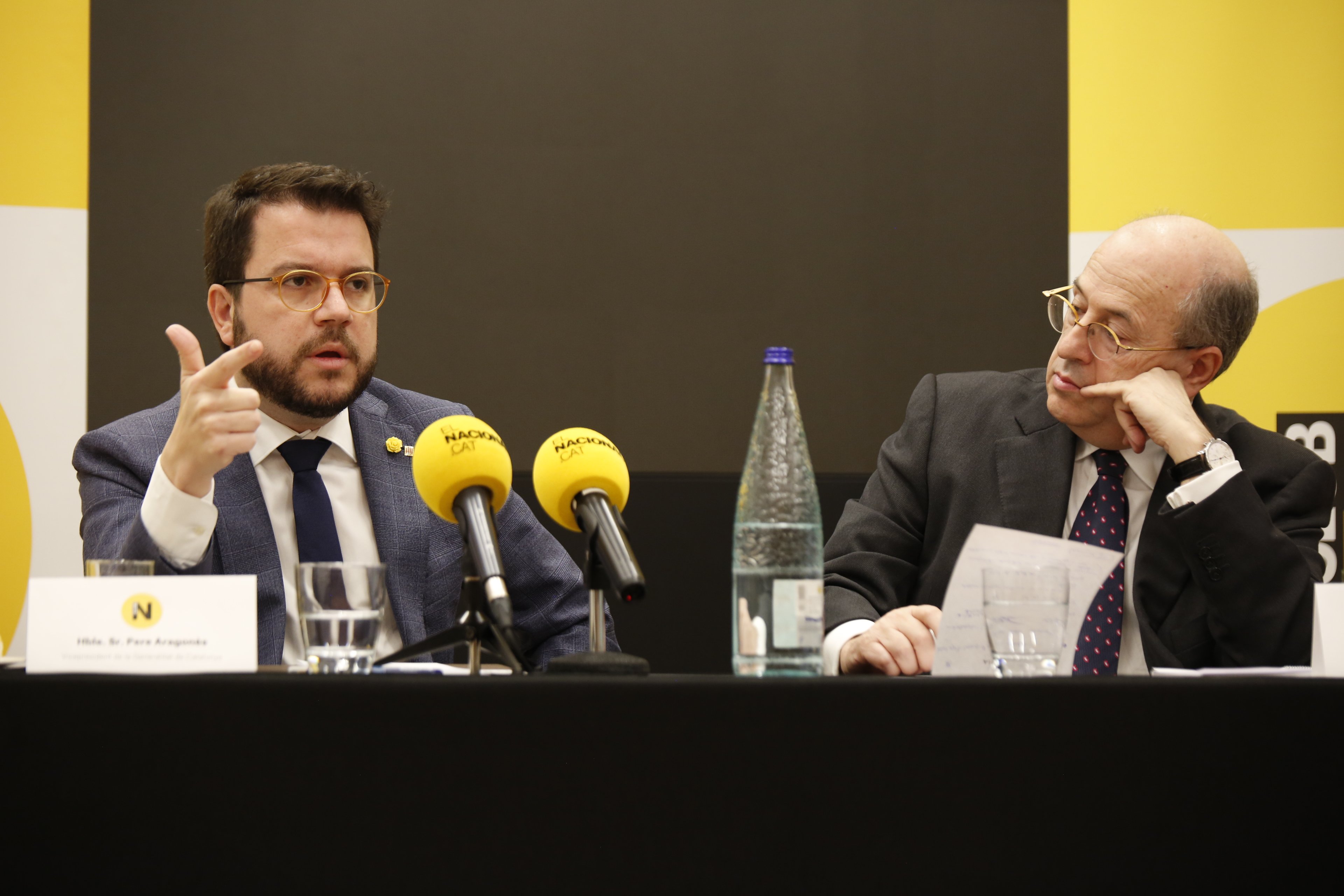The day after the first meeting around the dialogue table. Catalan vice president Pere Aragonès spoke about the beginning of a "new phase" and considered that this negotiation between Spanish and Catalan governments could be a "turning point" for Catalonia's independence process. That's what he stated at an exclusive breakfast for Club El Nacional members this morning at the Hotel Catalonia Diagonal Centro, where he also said that it is imperative that the independence movement expand its majorities and exceed 50% of the votes in the next Catalan election.
For Aragonès, this last point is essential in order to have more "strength" at the negotiation table and refute the argument used by the state when it says that "the independence movement divides" and that it does not have a majority. In that sense, he called for the independence movement to achieve "better" results and to strengthen itself "right across the territory." "We don't want a country divided into pieces. We don't want a republic where there are people who feel they are being imposed on," he said, calling for majorities that are "broader", "sustained over time" and stronger in the metropolitan area and in the country's large cities, where the current percentages of support for independence are low.
On this last point, the Republican Left (ERC) politician also recalled that the Popular Party (PP) had sought to end the independence process through the use of "judicialization" and "coercive force", but that at present the Socialists (PSOE) have shifted the angle towards "politics" - something he celebrated but also acknowledged was a "danger": "The state wants to beat us at the polls." That's why he emphasized the need for the independence movement to stop eyeing its allies to instead create a "broad strategy" that would help consolidate majorities in new elections.
"If you pave the way, you receive the blows, but we wanted to take it on"
On the other hand, the Catalan vice president called for continued mobilization to guarantee the strength of the independence movement at the table. "We won't empty the streets to fill the ballot boxes," he said after acknowledging that yesterday's meeting would not have been possible "without the mobilization of the people." He recalled the "Sit and Talk" movement that emerged during last October's intense protests against the Supreme Court verdicts, saying "If the independence movement goes to the airport, to the French border, to the streets and to the polls, and it tells us, make it possible, then we must take advantage of that."
With regard to this point, the man who is the day-to-day leader of ERC also took pride on his party's role in "breaking the ice" with the Spanish state in order to form the dialogue table, through the agreement with the Socialists to enable the formation of Pedro Sánchez's government. "If you pave the way, you receive the blows, but we wanted to take it on and if we were able to do so with others, so much the better," he said, after asserting that the opportunity to form a Socialist government and put an end to the PP era "could not be allowed to go by under any circumstances". "The independence movement must not give up the possibility of having capacity for influence anywhere," he said.
However, less than 24 hours after the meeting with the Spanish government, Aragonès assured that dialogue could open a "phase that leads to Catalonia's independence", but he noted that "there is still a lot of work ahead" and that "nothing has been won". "Yesterday was an important step, but we have a lot of work to do." He stated that they would never think of "renouncing" or "failing" given "the support and historical responsibility" behind them, or hand "the banner of dialogue" to the state.
The "three keys" to independence
Beyond the dialogue table, Aragonès made a diagnosis of the state of the independence process to the members of Club El Nacional. In this regard, in addition to increasing Catalan independence's majorities, he spoke of the need to strengthen the network with the country's civil society and business community, and emphasized that the international dimension is a "fundamental requirement" for moving forward.
Thus, he regretted that some of Catalonia's institutions had "turned away" or even "applauded" in October 2017, and for this reason he said the best option was to strengthen this network and build a "mesh" that was "impenetrable" to the blows of the state. On the other hand, he criticised the independence movement for its "sin" of thinking it was the centre of everything at some points, with regard to the international agenda.

"Is the world watching us? No. Let's be clear. The world isn't watching us, but it sees us," he continued, noting that it was Spain's repression that meant a "Catalan folder" had come to exist in "certain meetings and embassies". For this reason, he argued that work must go on to expand the international dimension of the process and to take advantage of the fact that the main international newspapers are paying attention at the start of negotiations, in order to force Spanish prime minister Pedro Sánchez to move.
Finally, the vice president took advantage of today's breakfast to call on all of the independence movement to "recapture the project positively" and to "reorganize its ranks" to stop focusing on political action and instead "to see how those beside us are doing it" and to go and convince "those in front."
Club El Nacional is the project that we launched at ElNacional.cat on October 1st 2019, which we want to use to continue expanding our community of readers committed to the country and, above all, to direct and live information. The next private Club breakfast will be with Lluís Llach on March 12th.

